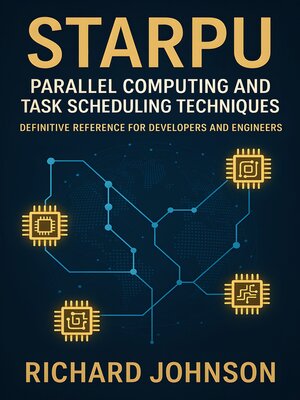
Sign up to save your library
With an OverDrive account, you can save your favorite libraries for at-a-glance information about availability. Find out more about OverDrive accounts.
Find this title in Libby, the library reading app by OverDrive.



Search for a digital library with this title
Title found at these libraries:
| Library Name | Distance |
|---|---|
| Loading... |
"StarPU: Parallel Computing and Task Scheduling Techniques"
"StarPU: Parallel Computing and Task Scheduling Techniques" presents a comprehensive exploration of parallel computing principles and the critical role of advanced runtime systems in orchestrating complex, heterogeneous workloads. The book commences with a rigorous introduction to the core concepts of parallel architectures, concurrency models, and synchronization challenges that define modern high-performance computing. Through detailed discussion of task-based parallelism and runtime system design, readers are equipped with the foundational knowledge necessary to navigate the rapidly evolving landscape of multicore, manycore, and distributed computing.
Central to the text is the in-depth examination of StarPU—a powerful, flexible runtime system for dynamic task scheduling on heterogeneous computing platforms. The architecture and programming model of StarPU are elucidated through explanatory chapters on task submission, codelet abstractions, multi-device data management, and advanced configuration. The book demystifies the relationship between task graphs, dependencies, and dataflow management, guiding readers in designing scalable applications and effectively leveraging StarPU's suite of built-in and custom schedulers. Practical insights are provided for maximizing resource utilization and performance across CPUs, GPUs, FPGAs, and hybrid computing environments.
Beyond the core system, the book delves into debugging, profiling, and performance tuning workflows, arming practitioners with sophisticated tools and methodologies for deadlock prevention and bottleneck resolution. Dedicated sections on distributed computation, scientific library integration, and workflow orchestration illustrate StarPU's applicability to real-world, large-scale problems. Concluding with forward-looking topics such as energy-aware scheduling, machine learning-based optimization, and expanding support for novel hardware, this expertly structured resource is essential reading for researchers, engineers, and software architects striving to harness the full potential of parallel and heterogeneous systems.







